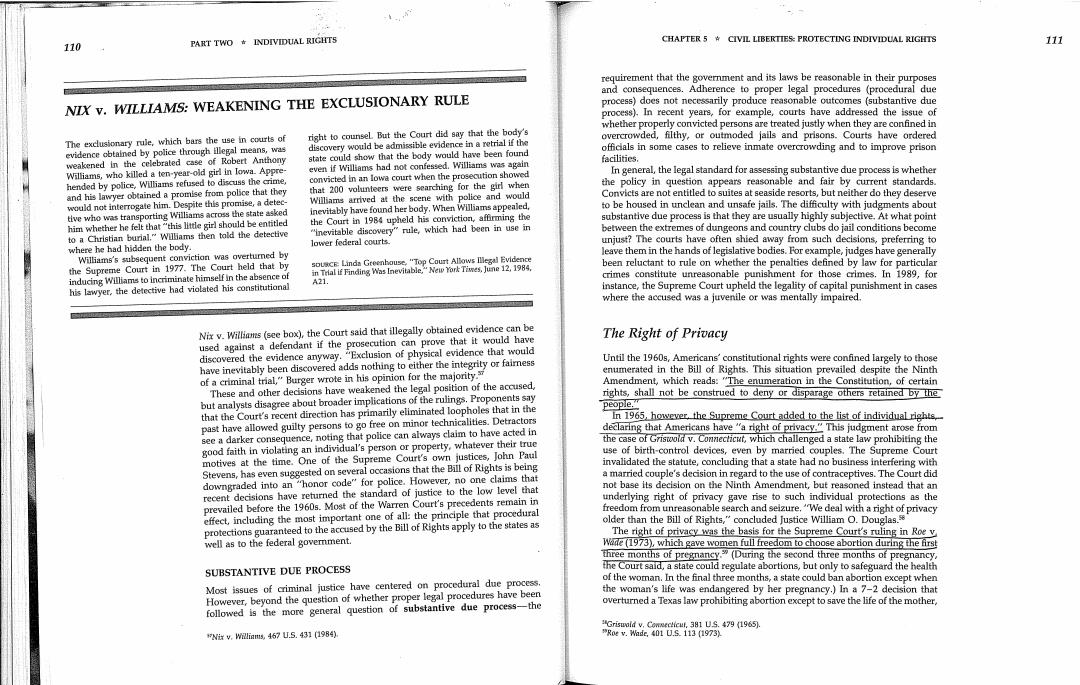正在加载图片...

PART TWO INDIVIDUAL RIGHTS CHAPTER 5 CIVIL LIBERTIES:PROTECTING INDIVIDUAL RIGHTS 111 110 requirement that the government and its laws be reasonable in their purposes and consequences.Adherence to proper legal procedures (procedural due NIX v.WILLIAMS:WEAKENING THE EXCLUSIONARY RULE process)does not necessarily produce reasonable outoomes (substantive due process).In recent years,for example,courts have addressed the issue of whether properly convicted persons are treated justly when they are confined in The exclusionary rule,which bars the use in courts of right to counseL But the Court did say that the body's overcrowded,filthy,or outmoded jails and prisons.Courts have ordered evidence obtained by police through illegal means,was discoveryuld bedmisbevdaretrial ifthe officials in some cases to relieve inmate overcrowding and to improve prison weakened in the celebrated case of Robert Anthony state could show that the body would have been found even if Williams had not confessed.Williams was aain facilities. Williams,who killed a ten-year-old gidl in lowa Appre- In general,the legal standard for assessing substantive due process is whether hended by police,Williams refused to discuss the crime, convicted in an lowa court when the prosecution showed that 200 volunteers were searching for the girl when the policy in question appears reasonable and fair by current standards. and his lawyer obtained a promise from police that they would not interrogate him.Despite this promise,a detec- Williams arrived at the scene with police and would Convicts are not entitled to suites at seaside resorts,but neither do they deserve to be housed in unclean and unsafe jails.The difficulty with judgments about tive who was transporting Williams acro the state选se inevitably have found her body.When Williams appealed, substantive due process is that they are usually highly subjective.At what point him whether he felt that"this little girl should be entitled the Court in 1984 upheld his conviction,affirming the to a Christian burial."Williams then told the detective "inevitable discovery"rule,which had been in use in between the extremes of dungeons and country clubs do jail conditions become where he had hidden the body. lower federal courts unjust?The courts have often shied away from such decisions,preferring to Williams's subsequent conviction was overtumed by leave them in the hands of legislative bodies.For example,judges have generally the Supreme Court in 1977.The Court held that by egal Evide been reluctant to rule on whether the penalties defined by law for particular inducing Williams to incriminate himself in the absence of A21. crimes constitute unreasonable punishment for those crimes.In 1989,for his lawyer,the detective had violated his constitutional instance,the Supreme Court upheld the legality of capital punishment incases where the accused was a juvenile or was mentally impaired. Nix v.Willias(see box),the Court said that illegally obtained evidence can be used against a defendant if the prosecution can prove that it would have The Right of Privacy discovered the evidence anyway."Exclusion of physical evidence that would have inevitably been discovered adds nothing to either the integrityor faimess Until the 1960s,Americans'constitutional rights were confined largely to those enumerated in the Bill of Rights.This situation prevailed despite the Ninth of a eriminal trial,"Burger wrote in his opinion for the majority. These and other decisions have weakened the legal position of the accused, Amendment,which reads:"The enumeration in the Constitution,of certain but analysts disagree about broader implications of the rulings.Proponents say rights,shall not be construed to deny or disparage others retained by the that the Court's recent direction has primarily eliminated loopholes that in the people." past have allowed guilty persons to go free on minor technicalities.Detractors In 1965,however,the Supreme Court added to the list of individual rights see a darker consequence,noting that police can always claim to have acted in declaring that Americans have "a right of privacy."This judgment arose from good faith in violating an individual's person or property,whatever their true the case of Griswid v.Conmecticut,which challenged a state law prohibiting the motives at the time.One of the Supreme Court's own justices,John Paul use of birth-control devices,even by married couples.The Supreme Court Stevens,has even suggested on several occasions that the Bill of Rights is being invalidated the statute,concluding that a state had no business interfering with downgraded into an "honor code"for police.However,no one claims that a married couple's decision in regard to the use of contraceptives.The Court did recent decisions have returned the standard of justice to the low level that not base its decision on the Ninth Amendment,but reasoned instead that an prevailed before the 1960s.Most of the Warren Court's precedents remain in underlying right of privacy gave rise to such individual protections as the effect,including the most important one of all:the principle that procedural freedom from unreasonable search and seizure."We deal with a right of privacy protections guaranteed to the accused by the Bill of Rights apply to the states as older than the Bill of Rights,"concluded Justice William O.Douglas.5 The right of privacy was the basis for the Supreme Court's ruling in Roe v well as to the federal govemment. (1973)which gave women full freedom to choose abortion during the fir three months of pregnancy.(During the second three months of pregnancy. SUBSTANTIVE DUE PROCESS the Court said,a state could regulate abortions,but only to safeguard the health Most issues of criminal justice have centered on procedural due process. of the woman.In the final three months,a state could ban abortion except when However,beyond the question of whether proper legal procedures have been the woman's life was endangered by her pregnancy.)In a 7-2 decision that followed is the more general question of substantive due process-the overturned a Texas law prohibiting abortion except to save the life of the mother, Wv.Wiam,457U.5.431(1984)